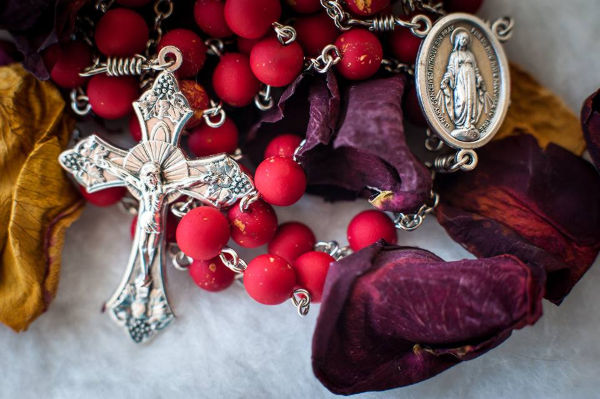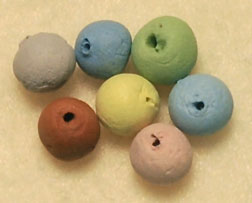The Rosary Shop
Supporting the life of prayer since 1996 with custom handmade rosaries, rosary kits, supplies, kneelers and prayer books.
This page is no longer monitored, and is here for information only. To order a custom rosepetal rosary or rosary repair, see the home page.
Handmade Rose Petal Rosaries

If you have flowers from a special event in your or a loved one's life -- wedding, birth, funeral, etc. -- we will be happy to create from them beads that can be incorporated into a rosary. This is sometimes referred to as a memorial, keepsake, legacy, remembrance or heirloom rose petal rosary.
How does it work?
- Place your order over the web site, by letter or phone. You can order the beads alone, or as part of a custom rosary. You can choose the bead size, shape and color (8mm round dark red is the most common, and what we make unless you specify otherwise).
- Mail your dried flowers to The Rosary Shop, 805 NW Alder St., McMinnville, OR 97128. One rose is enough to make a complete rosary (~60 beads). Drying the flowers is as easy as spreading them out in a warm oven (lowest setting) for about 30 minutes. Include any special instructions like bead color in a note with your package.
- We make the beads and ship the completed rosary or beads back to you, usually in about 2-4 weeks.
How much does it cost?
For the beads alone, the cost is $0.50 per bead, or $30 for enough for one rosary (60 beads). Custom rosaries start at about $65 with silver-plated parts. Gold plated, sterling silver, gold filled, 14k, flexwire and cord rosaries are also available. The price depends on the current cost of selected parts, and can vary.
Custom Rosepetal Rosary
This is a very simplified version of our online custom rosary design system. Click the "Customize Further" button if you want more control over the individual choices like the center, crucifix, decorative beads, etc.
If you have any special requests regarding the rosary construction, the shape, size or color of the beads, feel free to include them in writing when you mail in your flowers.
More Information about Our Processes
There are many different processes for making rose petal rosary beads, most of which involve boiling a large number of petals and mixing them with various organic ingredients. We do it a little differently because we not only wish to preserve the flowers, but want to make sure that the finished bead is going to last as long as possible. We chop and then grind the dried petals down, gently knead the rose powder into the chosen clay, hand-roll the beads to 8mm each and then fire them. We used to do this with ceramic clay, but now use polymer clay by default as it has many more color choices and is less abrasive to the rosary parts.
Close-up Image of Sample Beads
Polymer clay beads are available in almost any color, even mixed/swirled colors. They are smoother and the rose petal particles are visible in the clay. We recommend polymer clay and use it by default.

Ceramic clay beads are available in pastel colors, white and terra cotta. They generally have a rough exterior.

How to Order
- Try our fancy new rosary design system, or
- You can order the clay beads alone, or as part of a custom rosary kit or assembled rosary (or a rosary bracelet). Like our other rosaries, we can engrave most rose petal rosary crucifixes. This is our older design page.
- If you use the older page, please specify the clay material and the color in a separate note to us. You can custom select colors on this special page, and there is a convenient place to communicate the color ID and clay material on the final checkout page -- a "notes to us" section.
If ordering the beads alone or a small chaplet like a bracelet, there is a minimum charge of $25 for making the beads. If the online ordering system seems too complicated or confusing, please feel free to simply mail your roses to us along with a note describing your order. See the questions, below, for a list of the information we need.
After Ordering...
Once you place your order, please send your dried rose petals to us in a padded paper envelope (the petals are easily dried on a tray in an oven set to low heat). Our address is at the bottom of every web page. We will need at least the petals from one entire flower for each set of rosary beads. If you wish to send more, that is fine, but one will be enough (even a single petal is sufficient if that is all you have, as the bulk of the bead is clay). Please do not send them in a sealed plastic bag -- any residual moisture can lead to mold. If you send us petals that mold we will try to save and use what we can and supplement them with our own petals.
If you have any last-minute, special requests about the rosary, it is usually best just to include them in writing with the flowers.
Please allow 2 weeks from the time we receive your rose petals for us to make the beads -- up to 4 weeks if we are also making a rosary with them. Do not be alarmed if we do not use all of the roses that you send. It is important that we do not weaken the clay by adding too many rosepetals.
Common Questions
How do I preserve the flowers? It is best for us if they arrive already dried. They do not need to be on the stem. We remove the petals from the stem anyway and use only the petals in the clay. It is easy to dry petals by removing them from the stem, laying them on a cookie sheet and warming them on low heat in an oven, or by setting them in the sun for a few days.
Does the age of the flower matter? No. As long as there is some "flower" left, we can do it.
Is it okay if my flowers have been frozen? Yes. But please thaw and dry them before shipping.
Can you mix flowers from different events? Yes. For example, we have mixed flowers from two different funerals -- one for each spouse -- into a single batch of clay to make rosaries for the children, other relatives and friends. Some people have asked us to mix flowers from different special places that they visited, too.
How many flowers are needed? To assure the strength of the clay, we generally use no more than the petals from one average-size rose per complete rosary. Less is fine, even as little as one fragment of a petal, but we cannot use more without weakening the clay. Please do not send us all of your roses. It is rare, but sometimes they are lost in the mail, so save some back "just in case."
How do I know you used my flowers? (Yes, we've really been asked this). Well, you can come and watch us to make sure. But reasonably-speaking, we simply hold the order paperwork on file until the flowers arrive and individually match the roses with particular orders. We make the clay beads for only one order at a time, so there is simply no measurable chance of flowers getting mixed up between orders.
Will they last? In over a decade of making these we've never had a report of any of the beads breaking or dissolving.
The ordering system is too complicated! Okay, just mail us the flowers along with a note describing what you would like (in as much detail as possible). Be sure to specify at least the following:
- The kind of rosary or chaplet to make -- 5-Decade Dominican is the most common
- The color for the beads
- The kind of clay to use -- polymer or ceramic/earth (strong colors require polymer clay)
- The total number of rosaries we are to make
- Your mailing address
- Payment information (we can accept VISA, MasterCard and Discover Card). If you wish to pay by check, that is fine, too. We will call or e-mail you with the total.
- Budget limitations, if any -- remember, costs start at around $80 per rosary and go up depending upon your material selections
- Material to use for the metal parts; silver plate (or nickel), gold plate, sterling, gold filled or 14k white or yellow gold
- Part numbers you'd like us to use for the center and crucifix (we can select components to meet your budget, if you wish)
- Pouch or box item number
When we receive your package we will hand-enter the order and contact you with the amount due and any other questions.
Can you use other flowers and organic materials? Yes. We have made rosary beads using many different kinds of flowers, even grass from Notre Dame! If we can grind it up and mix it with clay, we can probably use it.
Can I use other beads, too? Yes. We often make rosaries with different Our Father beads. For example, someone might want pearls for the Our Father beads, but the rosepetal beads for the Hail Mary beads.
Why don't you make the beads from the roses only? Why add the clay? Long-lasting beads cannot be made from roses alone. In particular, organic-only beads will turn to mush if they get wet (and rosaries have a nasty habit of being left in pockets... in a washing machine). By using clay, we can provide a stronger bead that will last decades (or centuries), is impervious to damage from water, you can choose almost any color, and it will still contain the roses.
Can beadcaps be used on the beads? Yes. Select the ones for 8mm beads.
Can I order just a few beads, or multiple colors? Yes. But there is a $25 minimum charge per color due to the time and labor necessary to mix the clay, cleanup, etc. for each color.
How do your rosepetal rosaries differ from those made by others? Like any other skilled craft, there are many fine people who can do it well; we certainly aren't the only ones. Rosary beads have been made from roses and other organic materials for centuries. We are, to our knowledge, the first company to publicly establish a process by which the roses are mixed with ceramic or polymer clay for use on a rosary. I think we were the first ones to offer the service over the Internet, too. Like so much that we do, it all started because people were looking for a more durable remembrance rosary and so asked us to come up with a solution. However, there are now several rosary makers doing this with polymer clay; the polymer clay does not require a special kiln like the ceramic clay. We are confident in our own handiwork, and so guarantee it for life, but we are sure that most rosary makers do much the same. The single biggest difference will be the ability for you to custom design the entire rosary, choosing from hundreds of different centers and crucifixes, making it that much more unique. In addition, a brief survey of other heirloom rosary makers reveals that our lead time is usually shorter; we take about 4 weeks, where others are taking up to three months or longer.
Do-it-yourselfers
If you would like to make the beads yourself (using organic methods that can be performed on a stove-top, but which might not last as long as kiln-fired beads), here are some links to recipes: